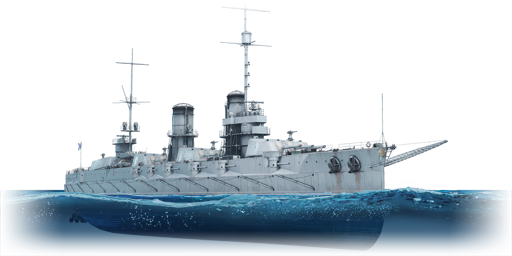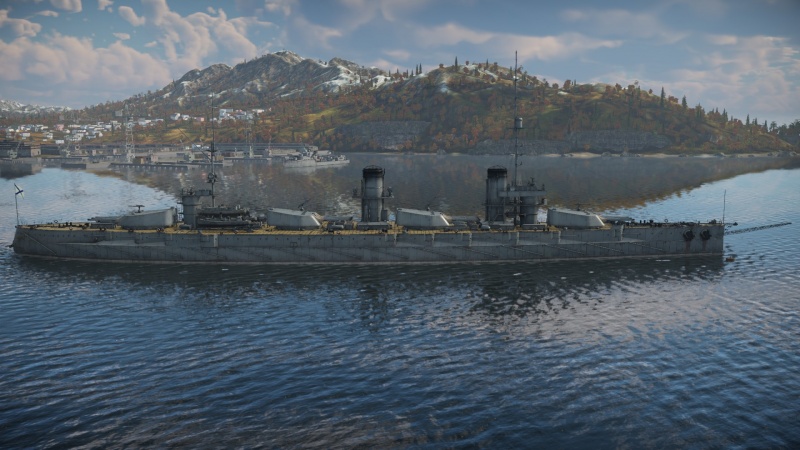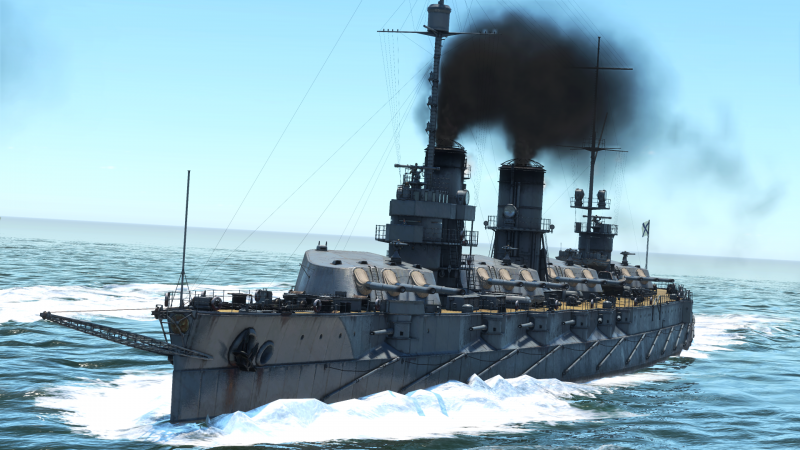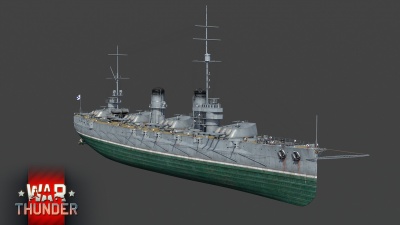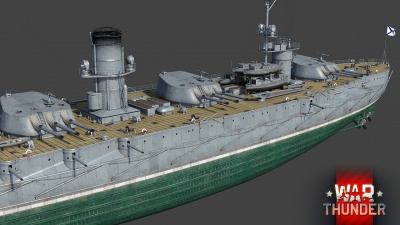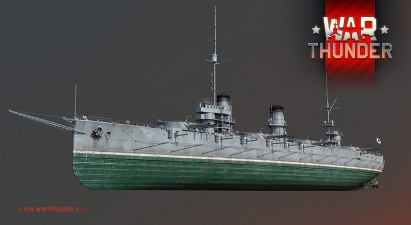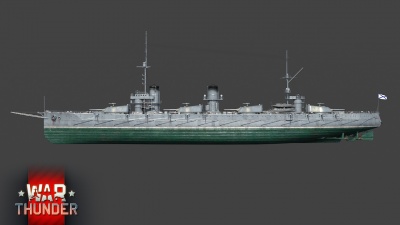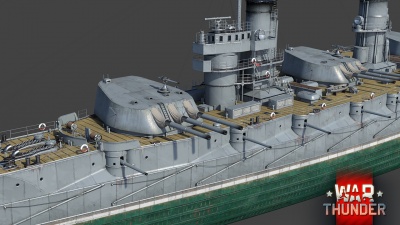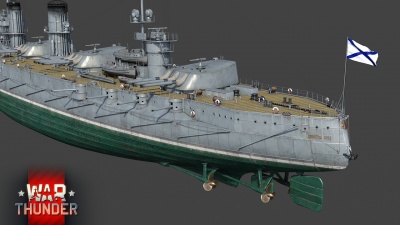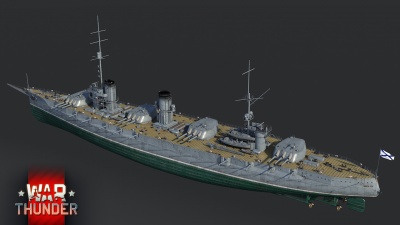Difference between revisions of "Imperatritsa Mariya"
(→Description) |
(→Armament) |
||
| Line 39: | Line 39: | ||
{{main|12-inch/52 pattern 1907 (305 mm)}} | {{main|12-inch/52 pattern 1907 (305 mm)}} | ||
| − | + | The Mariya is armed with twelve 12-inch/52 pattern 1907 (305 mm) cannons, placed in 4 triple turrets and arranged on the centreline of the ship. This is an important point as many other dreadnoughts (British and German in particular) have around the same number of cannons, but arranged with some turrets on either side of the ship, making it impossible or at least difficult to fire all the main guns at a single target, reducing their actual firepower by a fair amount. Because the Mariya has all her main turrets on the centreline, this isn't a problem, and you can unleash all 12 cannons at once. | |
| − | |||
| − | |||
The Mariya also carries a maximum of 1,200 shells, more than any other dreadnought, which gives you 100 full salvoes worth of ammunition. | The Mariya also carries a maximum of 1,200 shells, more than any other dreadnought, which gives you 100 full salvoes worth of ammunition. | ||
| Line 47: | Line 45: | ||
Whilst the cannons themselves have a relatively low muzzle velocity (762 m/s) with average dispersion and reload time, the high quality shells you have access to gives you a decisive advantage over many other dreadnoughts you'll face. | Whilst the cannons themselves have a relatively low muzzle velocity (762 m/s) with average dispersion and reload time, the high quality shells you have access to gives you a decisive advantage over many other dreadnoughts you'll face. | ||
| − | * '''HE''' - The HE shells which you start off with have just over 47 kg of TNT equivalent | + | * '''HE''' - The HE shells which you start off with have just over 47 kg of TNT equivalent, capable of wrecking even the most heavily armoured cruisers. Against battleships, these shell are powerful enough to deal good amount of damage on the exterior modules and compartments, such as turrets and gun barrels, and can occasionally poke some hole into the hull. Though like most HE shells, they are generally ineffective at dealing internal damage against dreadnoughts. |
| + | |||
| + | * '''APCBC''' - The armour-piercing shells are, overall, above average. They have a sizeable level of filler, at 12.96 kg of TNT equivalent, which is roughly equal to or better than most shells of other nations. While 524 mm of initial penetration is relatively average, they maintain good levels of penetration at long distances at 353 mm at 10 km range. | ||
| − | * ''' | + | * '''SAPCBC''' - The SAPCBC on the Mariya really takes the cake. It is one of the most devastating shells in the entire game, with a whopping 55.2 kg of explosive filler, which for reference is more than double the filler on the Graf Spee's HE shell, and is over 17 kg more than the [[IJN Ikoma]]/[[IJN Settsu|Settsu]]'s HE shell, in a semi-armour-piercing shell with 267 mm of penetration at 10 km. Capable of tearing apart cruisers and dreadnoughts alike, this shell should definitely be one of the first things you aim for after unlocking this ship. |
| − | + | Put simply, the 305 mm main guns on this ship are exceptionally strong and are capable of forcing the might of Imperial Russia over any other vessel you might encounter, even against more modern battleships. | |
{{:12-inch/52 pattern 1907 (305 mm)/Ammunition|12-inch HE patt.1911, 12-inch AP patt.1911, 12-inch SAP patt.1911}} | {{:12-inch/52 pattern 1907 (305 mm)/Ammunition|12-inch HE patt.1911, 12-inch AP patt.1911, 12-inch SAP patt.1911}} | ||
| Line 60: | Line 60: | ||
{{main|130 mm/50 pattern 1913 (130 mm)}} | {{main|130 mm/50 pattern 1913 (130 mm)}} | ||
| − | The Mariya has 20 x 130 mm cannons, 10 on each side of the ship. They're nothing to write home about. Being early 1900s destroyer calibre guns, the shells don't have much explosive filler and aren't too effective on their own, however you do have a truckload of them. They can be useful in taking out | + | The Mariya has 20 x 130 mm cannons, 10 on each side of the ship. They're nothing to write home about. Being early 1900s destroyer calibre guns, the shells don't have much explosive filler and aren't too effective on their own, however you do have a truckload of them. They can be useful in taking out less armoured vessels and for providing fire and ranging while waiting for the main guns to reload. |
{{:130 mm/55 pattern 1913 (130 mm)/Ammunition|130 mm HE patt.1911, 130 mm AP patt.1911}} | {{:130 mm/55 pattern 1913 (130 mm)/Ammunition|130 mm HE patt.1911, 130 mm AP patt.1911}} | ||
Latest revision as of 23:18, 9 November 2024
Contents
Description
The Imperatritsa Mariya-class, Imperatritsa Mariya, 1916 was the lead ship of her class of dreadnoughts built for the Imperial Russian Navy. The Imperatritsa Mariya-class was based on the Gangut-class dreadnought with some changes such as lower top speed and more armour. The sixteen secondary 120 mm guns found on Gangut-class were replaced by twenty 130 mm guns and the maximum elevation of guns was increased by 10 degrees compared to Gangut. Imperatritsa Mariya was laid down on 30th October 1911 and commissioned on 10th June 1915. She served as part of the Black Sea Fleet where she conducted escort missions of pre-dreadnought battleships bombarding Ottoman coast. On numerous occasions during October 1915, she engaged Ottoman light cruiser Midilli, causing nothing other than splinter damage to her. The rest of her short career was uneventful until 20th October 1916, when she sunk after magazine explosion while at anchor at Sevastopol. The crew managed to flood the forward magazines, preventing catastrophic explosion of all the other magazines. As the ship capsized, 228 crewmen were lost. She was raised in 1918, but her poor condition and chaos after the Russian Revolution caused her to further deteriorate. The hull was scrapped in 1926. Two of her gun turrets were salvaged and used as a coastal battery during the Siege of Sevastopol in WWII.
The Imperatritsa Mariya was introduced in Update "New Power". The Mariya is very similar to the Poltava, as the latter was also a development of the Gangut-class. The Mariya features more armour compared to Poltava, with turrets being up to 250 mm thick and barbettes up to 250 mm instead of 150 mm thick armour found on Poltava. Due to the added weight of the armour, the Mariya also has lower top speed by 3 km/h. The ship is armed with four triple 305 mm guns distributed by the length of the ship. The guns fire either HE, APHEBC, or SAP shells. The SAP shells are one of the best in their class with 55.2 kg TNTeq and up to 223 mm penetration on 10 km range, allowing for destroying or heavily damaging heavy cruisers or even lighter armoured battleships with a single salvo.
General info
Survivability and armour
The Imperatritsa Mariya, the lead ship of her class, is the successor to the Gangut-class (aka Sevastapol-class), which was the first class of dreadnoughts built by the Russian Empire.
The aesthetics of the ship are strange, with little to no superstructure on the deck and the unusual mooring boom on the bow, however in terms of effectiveness, the ship certainly has it where it counts. The Mariya is a classical example of a dreadnought, featuring heavy armour and high survivability. With a comprehensive armour scheme including a 262 mm main armour belt, as well as nearly 1,300 crewmen, the ship is all but invulnerable to most cruisers at anything other than close range and is fairly capable of protecting against battleship calibre shells at long and medium ranges, especially if angled. The main turrets of the ship are also well protected, with 250 mm turret faces and barbettes, and should be lost very rarely.
The ships magazines have a habit of detonating easily if you're on fire for extended periods of time.
Although the side protection of the ship is excellent, the magazines are vulnerable to shells fired from directly forwards or to the rear of the ship, due to thin bulkheads.
Mobility
Being an over 23,000 tons ship powered by inefficient coal fired steam turbines, the Mariya has overall very poor speed, acceleration/deceleration, and manoeuvrability, compared to even the heaviest of cruisers, although it's about on par with other dreadnought battleships. Don't expect to be able to cover any decent distance in a reasonable amount of time and good luck trying to dodge any torpedoes.
| Mobility Characteristics | |||
|---|---|---|---|
| Game Mode | Upgrade Status | Maximum Speed (km/h) | |
| Forward | Reverse | ||
| AB | |||
| Upgraded | |||
| RB/SB | |||
| Upgraded | |||
Modifications and economy
Armament
Primary armament
The Mariya is armed with twelve 12-inch/52 pattern 1907 (305 mm) cannons, placed in 4 triple turrets and arranged on the centreline of the ship. This is an important point as many other dreadnoughts (British and German in particular) have around the same number of cannons, but arranged with some turrets on either side of the ship, making it impossible or at least difficult to fire all the main guns at a single target, reducing their actual firepower by a fair amount. Because the Mariya has all her main turrets on the centreline, this isn't a problem, and you can unleash all 12 cannons at once.
The Mariya also carries a maximum of 1,200 shells, more than any other dreadnought, which gives you 100 full salvoes worth of ammunition.
Whilst the cannons themselves have a relatively low muzzle velocity (762 m/s) with average dispersion and reload time, the high quality shells you have access to gives you a decisive advantage over many other dreadnoughts you'll face.
- HE - The HE shells which you start off with have just over 47 kg of TNT equivalent, capable of wrecking even the most heavily armoured cruisers. Against battleships, these shell are powerful enough to deal good amount of damage on the exterior modules and compartments, such as turrets and gun barrels, and can occasionally poke some hole into the hull. Though like most HE shells, they are generally ineffective at dealing internal damage against dreadnoughts.
- APCBC - The armour-piercing shells are, overall, above average. They have a sizeable level of filler, at 12.96 kg of TNT equivalent, which is roughly equal to or better than most shells of other nations. While 524 mm of initial penetration is relatively average, they maintain good levels of penetration at long distances at 353 mm at 10 km range.
- SAPCBC - The SAPCBC on the Mariya really takes the cake. It is one of the most devastating shells in the entire game, with a whopping 55.2 kg of explosive filler, which for reference is more than double the filler on the Graf Spee's HE shell, and is over 17 kg more than the IJN Ikoma/Settsu's HE shell, in a semi-armour-piercing shell with 267 mm of penetration at 10 km. Capable of tearing apart cruisers and dreadnoughts alike, this shell should definitely be one of the first things you aim for after unlocking this ship.
Put simply, the 305 mm main guns on this ship are exceptionally strong and are capable of forcing the might of Imperial Russia over any other vessel you might encounter, even against more modern battleships.
| Penetration statistics | |||||||
|---|---|---|---|---|---|---|---|
| Ammunition | Type of warhead |
Penetration @ 0° Angle of Attack (mm) | |||||
| 1,000 m | 2,500 m | 5,000 m | 7,500 m | 10,000 m | 15,000 m | ||
| HE patt.1911 | HE | 71 | 71 | 71 | 71 | 71 | 71 |
| AP patt.1911 | APCBC | 522 | 471 | 398 | 340 | 295 | 238 |
| SAP patt.1911 | SAPCBC | 395 | 356 | 301 | 257 | 223 | 180 |
| Shell details | ||||||||||||
|---|---|---|---|---|---|---|---|---|---|---|---|---|
| Ammunition | Type of warhead |
Velocity (m/s) |
Projectile mass (kg) |
Fuse delay (s) |
Fuse sensitivity (mm) |
Explosive mass (TNT equivalent) (kg) |
Ricochet | |||||
| 0% | 50% | 100% | ||||||||||
| HE patt.1911 | HE | 762 | 470.9 | 0 | 0.1 | 47.48 | 79° | 80° | 81° | |||
| AP patt.1911 | APCBC | 762 | 470.9 | 0.05 | 17 | 12.96 | 48° | 63° | 71° | |||
| SAP patt.1911 | SAPCBC | 762 | 470.9 | 0.05 | 17 | 55.2 | 48° | 63° | 71° | |||
Secondary armament
The Mariya has 20 x 130 mm cannons, 10 on each side of the ship. They're nothing to write home about. Being early 1900s destroyer calibre guns, the shells don't have much explosive filler and aren't too effective on their own, however you do have a truckload of them. They can be useful in taking out less armoured vessels and for providing fire and ranging while waiting for the main guns to reload.
| Penetration statistics | |||||||
|---|---|---|---|---|---|---|---|
| Ammunition | Type of warhead |
Penetration @ 0° Angle of Attack (mm) | |||||
| 1,000 m | 2,500 m | 5,000 m | 7,500 m | 10,000 m | 15,000 m | ||
| HE patt.1911 | HE | 37 | 37 | 37 | 37 | 37 | 37 |
| AP patt.1911 | SAPBC | 178 | 151 | 115 | 89 | 71 | 55 |
| Shell details | ||||||||||||
|---|---|---|---|---|---|---|---|---|---|---|---|---|
| Ammunition | Type of warhead |
Velocity (m/s) |
Projectile mass (kg) |
Fuse delay (s) |
Fuse sensitivity (mm) |
Explosive mass (TNT equivalent) (kg) |
Ricochet | |||||
| 0% | 50% | 100% | ||||||||||
| HE patt.1911 | HE | 823 | 36.86 | 0 | 0.1 | 3.9 | 79° | 80° | 81° | |||
| AP patt.1911 | SAPBC | 823 | 36.86 | 0.015 | 5 | 1.67 | 48° | 63° | 71° | |||
Anti-aircraft armament
The 75 mm AA guns are not very effective. With only 4 slow-firing guns and weak timed-fuse HE shells, it is recommended to instead stick close to friendly cruisers that can provide much more comprehensive AA cover.
Additional armament
As with other dreadnoughts from this era, the Imperatritsa Mariya features four fixed underwater torpedo tubes placed in pair on her bow and stern on each side. The torpedo itself, however, is extremely weak with only 100 kg of TNT warhead, and have very short range of only 6 km even with torpedo mode. Being a highly situational weapon, it is advised to only focus on her gunnery instead.
Usage in battles
Slow, heavily armed and armoured, the Imperatritsa Mariya is a textbook example of a classic dreadnought. With her twelve powerful 305 mm guns and large amount of secondary 130 mm guns, she can pose a threat against any ship smaller than a dreadnought and is a perfect match against the "super dreadnoughts" such as the Hyuga and the Marlborough. However, the Mariya does share the same key weaknesses of dreadnoughts in her era. The first is poor top speed and mobility, which made her highly vulnerable against torpedoes, especially the "Long Lance" torpedoes that were common among the late-tier Japanese ships. The second is her poor anti-air armament consists of an early 75 mm flak cannons, while this is certainly better than an antique machine guns, it is still not so useful against enemy aircraft.
The Mariya perform best at longer range (10 km or more) as she can provide heavy fire support against lighter ship while being nearly invulnerable from their retaliation, especially when angled. If possible, stay behind any low-laying islands or lagoon to provide cover from enemy torpedoes. Otherwise, when playing in an open sea map (such as in conquest mode), avoid moving in a straight line and instead periodically stop the ship to make it less predictable to any enemy ship who wanted to take you down with torpedoes.
Pros and cons
Pros:
- Extremely heavy firepower, with very powerful shells
- All of her 12 x 305 mm guns can be fired broadsides
- Large amount of casemate 130 mm guns provided good supplementary fire support against cruisers
- Heavily armoured against most threats
Cons:
- The main guns have extremely long reload time (33 seconds with ace crew)
- Poor mobility and huge profile, can be easily targeted
- Poor anti-air defence
- Secondary guns are located on between-deck mounts, cannot be fully traversed to meet threats on both sides
- Prolonged fire damage can cause her magazine to detonate and destroy the ship
History
Devblog
The first battleships of the "dreadnought" type in the Russian Empire entered service with the Baltic Fleet, they were battleships of the Sevastopol type, laid down back in 1909. The proximity of a world war and information about the serious strengthening of the Ottoman fleet forced the Tsarist government to start building three battleships similar to the ones in the Baltic for the Black Sea Fleet. The general architecture, key technical units, three-gun turrets were borrowed from the battleships "Sevastopol". Three battleships for the Black Sea Fleet were laid down in 1911, all new ships were named after the Russian monarchs. Tests of the battleship Imperatritsa Mariya (Russian for "Empress Mariya") ended in 1915, the ship was immediately put into service and began to perform combat missions.
With the advent of Russian dreadnoughts, the situation on the Black Sea changed dramatically in favor of the Russian Empire. Imperatritsa Mariya provided support to the 2nd brigade of battleships near the Ottoman coastline in the fall of 1915, at the end of winter it took part in the Trebizond landing operation, and in the summer of 1916 became the flagship of the Russian Black Sea Fleet.On October 20th, a powder storage detonated and a fire occurred on the ship, the subsequent series of explosions caused the destruction of the battleship. More than 200 sailors perished, the ship sank near Sevastopol. With great effort in 1918 the ship was lifted and transferred to dry dock, but restoration work was never completed due to the social and political crisis in post-war Russia. In 1927, the battleship Imperatritsa Mariya was dismantled for its metal.
Media
- Skins
- Images
- Imperatritsa Mariya Devblog Images
- Videos
See also
Links to articles on the War Thunder Wiki that you think will be useful for the reader, for example:
- reference to the series of the ship;
- links to approximate analogues of other nations and research trees.
External links
| Shipyard named after 61 Communards (Судостроительный завод имени 61 коммунара) | |
|---|---|
| Destroyers | |
| Project 7U | Soobrazitelny |
| Project 30 | Ognevoy |
| Project 30-bis | Bezuprechny |
| Project 56 | Blagorodnyy · Bravy |
| Light Cruisers | |
| Svetlana-class | Krasny Kavkaz* |
| Battleships | |
| Imperatritsa Mariya-class | Imperatritsa Mariya* |
| *Previously Russud Shipyard | |
| USSR battleships | |
|---|---|
| Imperial Russia | |
| Sevastopol-class | Marat* · Parizhskaya Kommuna** · Poltava |
| Imperatritsa Mariya-class | Imperatritsa Mariya |
| * Laid down as Petropavlovsk; renamed and remodeled by the USSR ** Laid down as Sevastopol; renamed and remodeled by the USSR | |
| Trophies | Italy |
| Conte di Cavour-class | Novorossiysk* |
| * Laid down as RN Giulio Cesare for the Regia Marina | |


